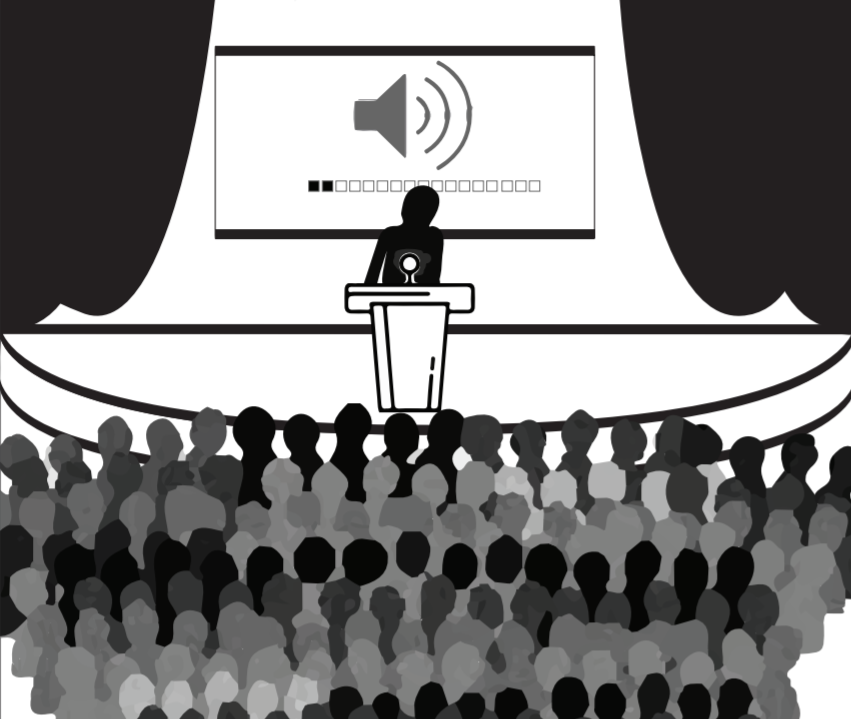UW erodes students’ free speech
February 19, 2018
Fellow students, you might want to start watching your volume.
Thanks to a new University of Wisconsin System policy, if your speech, protest or demonstration “substantially disrupts” another person’s speech or choice to listen to someone else’s speech, it will be regarded as misconduct and can be treated like other criminal actions that warrant university discipline, ranking up there with damage to property or violations of municipal law.
What does this mean for you?
Suppose a speaker has been invited to campus who you disagree with so fundamentally that it’s offensive to you that the university would even think to invite them on campus. This doesn’t just apply to those so-called “snowflake liberals” who impose tyranny of the majority across UW campuses whose tears drown the campus over the words “conservative” or “MAGA.” Suppose someone who has, in their past, advocated for genocide of any race of persons, or decreed that people with “X” trait are all bad. Their speech may not concern controversial views you’re upset about, but don’t you have a right to tell your university that you don’t want to be affiliated with a school that overlooks such views and brings them to campus?
Well, yes, as long as your dissent isn’t disruptive – or audible.
Maybe a better way to think of this free speech predicament is this: you want to make sure the bullet in your gun doesn’t go into your right foot, so instead, you remedy the problem by shooting your left foot.
Problem solved, right?
Any time a governmental body has to restrict lawful free speech in order to protect a different form of lawful free speech, it doesn’t really solve anything.
Despite this, it’s important to note that free speech is not absolute. In the classroom, students at all levels aren’t guaranteed unrestricted rights to free speech because of the school’s substantial interest in educating students. Any speech that gets interrupts instruction can be shut down. You also can’t incite violence or illegal activity as a result of your speech.
As long as your speech isn’t prohibiting your classmates from learning and isn’t advocating for lawless action, you should have the full right to speak without the threat of punishment (in our case here in the UW System, students are at risk of expulsion from the university for too many incidents).
It’s reasonable for all of us to comply with restrictions on our speech that are related to the time, place and manner of what we’re saying. We do that all the time – there are noise ordinances we should be following when we’re having a good time with our friends and restrictions on how close we can be to certain buildings if we choose to smoke a cigarette on campus.
The problem is that there’s not a clear-cut standard for how loud a person can be before they receive punishment. A person can be in the front of an auditorium shouting at a speaker they don’t agree with, and there might be a person who’s in the back of that same auditorium who might be yelling just as loud as you are, but very likely the one who is closer is going to receive some sort of disciplinary sanction for their actions, despite their actions being identical.
And it’s the same situation with what exactly a person has chosen to say. Two people might be yelling at the same loudness, but one has a more sensational comment than the other. Who do you think school administrators would have an issue with?
In addition to restricting student speech, these guidelines are unconstitutional: the way the language is written, the respective university is already taking the side of the speaker over the student. In order for a governmental body like a public university to be content neutral, like the document states it should be, the guidelines shouldn’t be written so that it only limits the students’ right to speak. That kind of automatic favoritism for a speaker is far from neutrality.
No students want to see their chance at earning a diploma threatened because they choose to use their right to free speech, so for now they need to be cautious in respect to how they dissent.
So, students, we hope you’re ready to hold up a lot of signs in a silent protest. Being quiet seems to be the safest way to make sure your voice is heard from now on.











